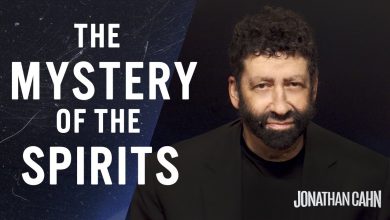The Mystery Of The Trinity | Jonathan Cahn Sermon
The Mystery Of The Trinity | Jonathan Cahn Sermon
The Bible is clear: Jesus is the head, the firstfruits of resurrection, and the firstborn over all creation. However, He is much more than that. Scripture reveals that He existed before He was born into this world.
Tonight, we will explore this profound mystery—the deity of the Messiah—one of the most widely misunderstood truths in the world. The concept of the Trinity, the triune nature of God, is beyond complete human comprehension. If we could fully understand everything about God, we would be God ourselves—but we are not. Instead of trying to contain God within human logic, we must recognize that He is the One who contains us.
Common Objections and Biblical Truth
Some argue against Christ’s divinity by asking, “If Jesus was God, how could He pray to God? Was He praying to Himself?” The answer is clear: Jesus, or Yeshua, is God, but He is not the Father—He is the Son. When Jesus prayed, He was speaking to the Father, not to Himself.
God is love, and love requires relationship. This is why God exists as Father, Son, and Holy Spirit—a perfect unity of love. Some also question, “If Jesus was God, how could He not know certain things?” The answer lies in the Bible’s teaching that Jesus willingly emptied Himself when He came into the world. He took on human form, experiencing weakness, suffering, and even death. He relinquished His divine privileges to fully share in our humanity.
Even His coming into the world was, in a sense, an act of dying for God. He did not enter this world to live—He was already the source of life. He came to die, for only through taking on a physical body could He experience death on behalf of humanity.
The Agony in Gethsemane
Another common question is: “If Jesus is God, why did He pray in Gethsemane, asking the Father to remove the cup of suffering?” The answer is deeply profound. As the Son, Jesus had the right to ask anything of the Father. His plea was not a sign of weakness but a demonstration of the immense suffering He faced. He saw the full weight of judgment, the agony of the cross, and the cost of salvation. Yet, He ultimately submitted to the Father’s will, declaring, “Not my will, but Yours be done.”
This moment does not disprove His divinity but instead highlights His perfect submission. The Father and the Son are distinct, yet they remain one. Even from the very first verse of the Bible, we see a glimpse of this divine mystery:
In Hebrew, the word for “God” (Elohim) is plural, but the verb “created” is singular—breaking normal grammatical rules. This unusual structure reveals that God is greater than our limited understanding. The very name “Elohim” implies that He is more than we can comprehend.
The Son’s Position Under the Father
Some may ask, “If Jesus is God, why does He submit to the Father?” This question misunderstands the nature of their relationship. Just as a son submits to his father, Jesus submits to the Father—not because He is lesser in essence, but because submission is an expression of love.
For example, imagine a child drawing a family chart. One might place parents above them, a leader or ruler above the parents, and at the top, perhaps even a younger sibling who seems to receive special privileges. The child might protest, feeling unfairly treated, but one thing remains true—he is still under his father’s authority.
Likewise, Jesus, as the Son, submits to the Father out of love and obedience. Yet, this does not diminish His divinity. Just as a son shares the same nature as his father, Jesus shares the divine nature of God.
Conclusion
The mystery of the Trinity may be beyond human comprehension, but Scripture affirms that Jesus is fully God and fully man. He existed before creation, took on human form, submitted to the Father, and gave His life for our salvation. Through Him, we see the perfect example of love, obedience, and divine truth.
Would you like me to refine this further for SEO optimization on Red Católica?

Barbara D Humphrey - 2025-04-28 21:32:30
HEAL MY DAUGHTER SUSAN OF STAGE 4 LUNG CANCER AND MY SON SAM
FROM BYPOLOR AND SCHIZOPHRENIA